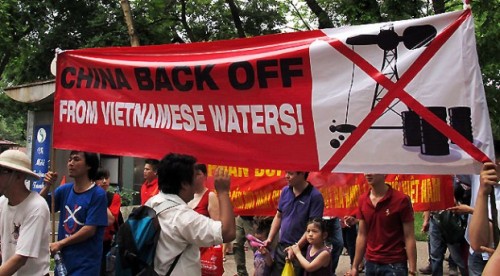(Photo Credit: AP)
(BGF) – This article, recently published in The Boston Globe, discusses the issue of Vietnamese protests against China’s placement of an offshore oil rig in disputed waters. As the article notes, Vietnam’s leaders are in a complicated situation in which they want to allow protests against China in order to magnify Vietnam’s opposition to China’s actions in the South China Sea, but they do not want to allow the protesters to turn their attention to Vietnam’s authoritarian rule. This situation is further complicated by the fact that China is one of Vietnam’s largest trade partners. Click here to read the full article or visit The Boston Globe‘s website.
Protests Over China Pose Test for Vietnam’s Leaders
By Chris Brummitt
HANOI— Vietnamese anger toward China is running at its highest level in years after Beijing deployed an oil rig in disputed waters. That’s posing a tricky question for Vietnam’s leaders: To what extent should they allow public protests that could morph into those against their own authoritarian rule?
At one level, the ruling Communist Party would like to harness the anger on the street to amplify its own indignation against China and garner international sympathy as naval ships from both countries engage in a tense standoff near the rig off the Paracel Islands in the South China Sea.
But Vietnam’s government instinctively distrusts public gatherings of any sort, much less ones that risk posing a threat to public order. And they also know that members of the country’s dissident movement are firmly embedded inside the anti-China one, and have used the issue to mobilize support in the past.
On Saturday, around 100 people protested outside the Chinese Consulate in the country’s commercial capital, Ho Chi Minh City, watched over by a large contingent of security officers. Dissident groups have called for larger demonstrations on Sunday in Ho Chi Minh City and in Hanoi.
A statement widely circulated on Facebook and dissident blogs called for protests on Sunday morning in Hanoi outside the Chinese Embassy and a Chinese cultural center in Ho Chi Minh City. In past years, authorities have only allowed anti-China demonstrators to walk around a lake in downtown Hanoi.
‘‘Facing the danger of Chinese aggression appropriating the sacred East Sea, the source of livelihood of the Vietnamese over generations, we are determined not to compromise,’’ said a statement posted alongside the protest call that used the Vietnamese term for the South China Sea.
‘‘ We cannot continue to compromise and be vile and sinful to our heroic ancestors and feel ashamed before our future generations,’’ it said.
The last time there was a flare-up in the South China Sea in 2011, anti-Chinese protests lasted weeks, and some protesters voiced slogans against the government. Authorities used force to break them up.
‘‘The state is in a truly difficult position,’’ said Jonathon London, a specialist on Vietnam at Hong Kong’s City University. ‘‘By expressing its stern objections to China, it also invites expressions of dissent from Vietnamese that can take multiple forms. Certainly there is some overlap between those who want to express their anger at China, and those who are calling for basic reforms.’’
Click here to continue reading.
